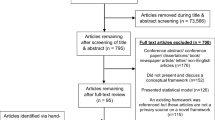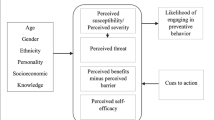Abstract
Cancer patients have an increased risk of severe COVID-19 outcomes and were recommended to be vaccinated, wear a mask, practice social distancing, and increase hand hygiene. We used the Health Belief Model (HBM) to identify constructs that were associated with the likelihood of adhering to and advocating for CDC COVID-19 prevention recommendations. We surveyed adult cancer patients who had an onsite appointment at the Penn State Cancer Institute or at the Hematology and Oncology Associates of Northeastern Pennsylvania. Survey measures included adherence to and informing others of COVID-19 recommendations as well as HBM constructs. Relationships between HBM constructs and outcomes were assessed with Spearman’s correlation and multivariable ordinal logistic regression. Of the 106 participants who completed the survey for our objectives of interest, 76% always wore a mask, 29% always practiced social distancing, and 24% washed their hands at least 10 times a day. Limited advocacy behaviors were captured for the COVID-19 vaccine (30%), social distancing (36%), and wearing masks (27%). Perceived benefits, perceived barriers, and cues-to-action were positively associated with the likelihood of adherence or advocacy of COVID-19 recommendations among cancer patients, whereas perceived susceptibility and self-efficacy were negatively associated with the likelihood of adherence or advocacy of COVID-19 recommendations among cancer patients. Perceived benefits may be the strongest predictor for adherence and advocacy for specific COVID-19 guidelines. Future messaging and educational campaigns focused on improving adherence to or advocacy of specific health behaviors should be informed by the HBM and originate from multiple outlets.

Similar content being viewed by others
References
Nadkarni A, Vijayakumaran S, Gupta S, Divatia J (2021) Mortality in cancer patients with COVID-19 who are admitted to an ICU or who have severe COVID-19: a systematic review and meta-analysis. JCO Global Oncology 7:1286–1305. https://doi.org/10.1200/GO.21.00072
Centers for Disease Control and Prevention (2022) Staying well during COVID-19: a guide for cancer patients and their caregivers and family members. https://www.cdc.gov/cancer/survivors/staying-well-during-covid-19.htm. Accessed 01 Aug 2022
Islam JY, Camacho-Rivera M, Vidot DC (2020) Examining COVID-19 preventive behaviors among cancer survivors in the United States: an analysis of the COVID-19 impact survey. Cancer Epidemiol Biomarkers Prev. https://doi.org/10.1158/1055-9965.EPI-20-0801
Musche V, Bauerle A, Steinbach J et al (2020) COVID-19-related fear and health-related safety behavior in oncological patients. Front Psychol. https://doi.org/10.3389/fpsyg.2020.01984
Glanz K, Rimer BK, Viswanath K (eds) (2008) Health behavior and health education: theory, research, and practice, 4th edn. Jossey-Bass
Slivjak ET, Fishbein JN, Nealis M et al (2021) Cancer survivors’ perceived vulnerability to COVID-19 and impacts on cognitive, affective, and behavioral responses to the pandemic. J Psychosoc Oncol. https://doi.org/10.1080/07347332.2021.1887430
Fares A, Maritan R, Ribeiro V et al (2022) Adherence and perception of the importance of anti-COVID-19 protective measures amongst patients with cancer. J Clin Oncol. https://doi.org/10.1200/JCO.2022.40.16_suppl.e24120
Kassianos AP, Georgiou A, Kyprianidou M et al (2021) Mental health and adherence to COVID-19 protective behaviors among cancer patients during the COVID-19 pandemic: an international, multinational cross-sectional study. Cancers (Basel). https://doi.org/10.3390/cancers13246294
Wu J, La J, Branch-Elliman W et al (2021) Association of COVID-19 vaccination with SARS-CoV-2 infection in patients with cancer a US Nationwide Veterans Affairs study. JAMA Oncol. https://doi.org/10.1001/jamaoncol.2021.5771
Washburn L (2020) Understanding the health belief model. https://extension.tennessee.edu/publications/Documents/W931-C.pdf. Accessed 12 Apr 2023
Mirzaei A, Kazembeigi F, Kakaei H et al (2021) Application of health belief model to predict COVID-19-preventive behaviors among a sample of Iranian adult population. J Educ Health Promot. https://doi.org/10.4103/jehp.jehp_747_20
Wong Li, Alias H, Wong P-F et al (2020) The use of the health belief model to assess predictors of intent to receive the COVID-18 vaccine and willingness to pay. Hum Vaccin Immunother. https://doi.org/10.1080/21645515.2020.1790279
Tong KK, Chen JH, Yu EW, Wu AMS (2020) Adherence to COVID-19 precautionary measures: applying the health belief model and generalised social beliefs to a probability community sample. Appl Psychol Health Well-Being. https://doi.org/10.1111/aphw.12230
Zewdie A, Mose A, Sahle T et al (2022) The health belief model’s ability to predict COVID-19 preventative behavior: a systematic review. SAGE Open Med. https://doi.org/10.1177/20503121221113668
Banerjee A, Alsan M, Breza E, Chandrasekhar A et al (2020) Messages on COVID-19 prevention in India increased symptoms reporting and adherence to preventive behaviors among 25 million recipients with similar effects on non-recipient members of their communities. Natl Bur Econ Res. https://www.nber.org/papers/w27496. Accessed 12 Apr 2023
Bowles J, Larreguy H, Liu S (2020) Countering misinformation via WhatsApp: preliminary evidence from the COVID-19 pandemic in Zimbabwe. PLoS One. https://doi.org/10.1371/journal.pone.0240005
Acknowledgements
Savanna Ledford was supported by the Cancer Epidemiology Education in Special Populations (CEESP) Program (Grant R25CA112383) from the National Cancer Institute. The content is solely the responsibility of the authors and does not necessarily represent the official views of the National Cancer Institute or the National Institutes of Health.
Author information
Authors and Affiliations
Contributions
All authors contributed to the study conception and design. Material preparation, data collection and analysis were performed by Savanna Ledford with the assistance of all authors. The first draft of the manuscript was written by Savanna Ledford and all authors commented on previous versions of the manuscript. All authors read and approved the final manuscript.
Corresponding author
Ethics declarations
Ethics Approval
This study was determined by Penn State IRB (STUDY00019970) to be exempted from regulatory review because the dataset provided by the PA DOH to Penn State did not include personally identifiable information.
Consent to Participate
The parent study obtained informed consent from all individual participants in the study.
Consent for Publication
The parent study obtained informed consent regarding sharing data with other scientific groups via a legal data-sharing agreement.
Competing Interests
Conflict outside of this work in the past 3 years for Monika Joshi includes research grants for AstraZeneca, Pfizer, Eisai (drug only), and BMS advisory board—Seagen.
Additional information
Publisher's Note
Springer Nature remains neutral with regard to jurisdictional claims in published maps and institutional affiliations.
Supplementary Information
Below is the link to the electronic supplementary material.
Rights and permissions
Springer Nature or its licensor (e.g. a society or other partner) holds exclusive rights to this article under a publishing agreement with the author(s) or other rightsholder(s); author self-archiving of the accepted manuscript version of this article is solely governed by the terms of such publishing agreement and applicable law.
About this article
Cite this article
Ledford, S.G., Moss, J.L., Alles, S. et al. Behaviors and Advocacy Related to COVID-19 among Cancer Patients: The Health Belief Model and Opportunities for Messaging and Education. J Canc Educ 38, 1690–1696 (2023). https://doi.org/10.1007/s13187-023-02323-7
Accepted:
Published:
Issue Date:
DOI: https://doi.org/10.1007/s13187-023-02323-7




